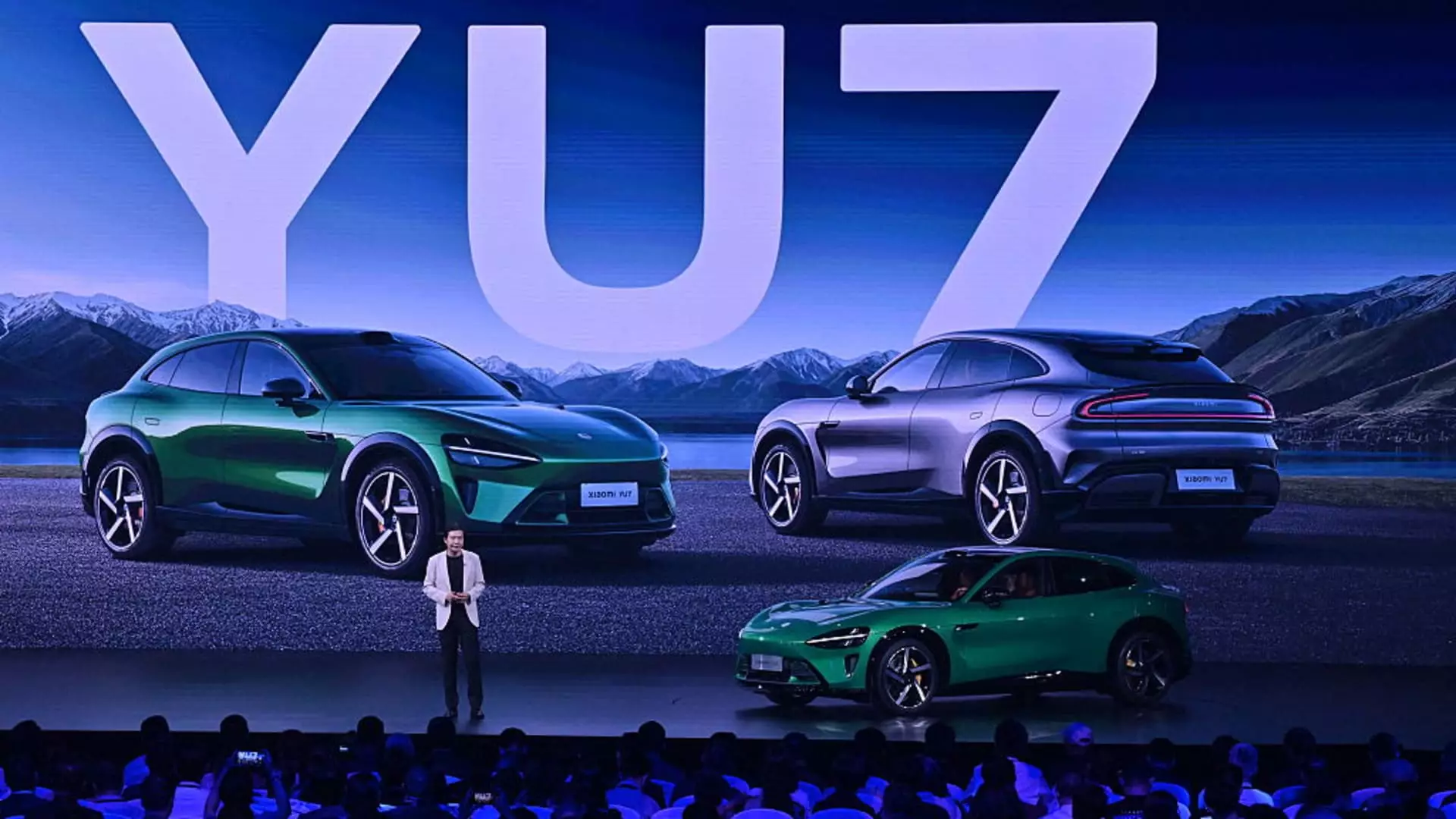Xiaomi, renowned primarily for its cutting-edge smartphones, has made a shocking incursion into the electric vehicle (EV) market with its new model, the YU7 SUV. This bold step demonstrates the company’s ambition to not just participate in the growing EV sector but to challenge established giants like Tesla head-on. With Xiaomi’s reputation for making technology accessible and affordable, its entry into the automotive arena has set the stage for fierce competition and innovation.
The YU7 SUV boasts an impressive driving range of at least 760 kilometers (approximately 472 miles) on a single charge. This detail is not merely a statistic but a masterstroke aimed directly at alleviating consumer anxieties surrounding battery life—a pivotal concern for modern car buyers. Tesla’s popular Model Y, for context, offers a driving range of 719 kilometers, which highlights that Xiaomi has clearly set its sights on eclipsing Tesla’s foothold in the market.
Strategic Pricing and Market Positioning
Not only does the YU7 promise a significant range advantage, but its pricing strategy also suggests a calculated approach to market penetration. Analysts forecast the YU7 to be priced between 250,000 yuan to 320,000 yuan ($34,700 to $44,420). This renders it a direct competitor to Tesla’s Model Y, which is initially priced at 263,500 yuan in China. Xiaomi’s proactive pricing strategy does not simply aim to attract cost-conscious consumers; it signals a clever maneuver to gain significant market share by offering superior specifications at a comparable price point.
Market analysis from Citi underscores this potential impact, predicting that the YU7 could sell around 30,000 units monthly, translating to an annual figure between 300,000 to 360,000 units. Such projections indicate that Xiaomi is not merely aiming for a slice of the EV pie; it’s poised to take an aggressive bite out of Tesla’s market share. The implications of this dynamic extend beyond numbers—they indicate a shift in consumer choices and preferences as competition intensifies.
The Consumer Perspective: Rise of the Luxury SUV
Positioned as a “luxury SUV,” the YU7 appeals to a segment of consumers looking for status without transcending their budget. The distinct appeal lies in Xiaomi’s ability to marry cutting-edge technology with affordability—a challenge that Tesla has yet to fully address in the same realm. The earlier release of the SU7 sedan, priced lower than Tesla’s Model 3, shows Xiaomi’s dedication to disrupting the status quo, making high-quality electric vehicles accessible to a broader audience.
What’s even more telling is the current EV landscape in China, which has witnessed varied competitors filling niches from budget-friendly options to more premium offerings. Data from Autohome reflects this competitive environment; Tesla’s Model Y stands as one of the most sold new energy vehicles, yet Xiaomi’s own SU7 was already making waves prior to the YU7 launch. This paints a picture of a rapidly evolving market, where consumer trust and brand loyalty are perpetually challenged.
Navigating Controversies in Launches
However, Xiaomi’s journey has not been without its obstacles. Following a tragic accident involving the SU7, which left three people dead, heightened scrutiny is now being applied to advertising practices around driver-assist capabilities. This incident reflects the broader challenge facing the EV sector: how to balance technological advancements with user safety and regulatory compliance. A market that seems indeed ready for innovation is also one that holds manufacturers accountable for ensuring consumer protection.
Xiaomi’s dual endeavor of launching a premium phone alongside the YU7 SUV at its unveiling event also highlights its strategy of synergy across product lines—an approach reminiscent of Apple’s ecological model. The tech company leads with a narrative that creates anticipation not just for cars but for an integrated lifestyle. While the exact pricing of the YU7 awaits its official announcement in July, the marketing campaign surrounding this launch will be pivotal in shaping public perception and acceptance.
The Future of Xiaomi and the EV Market
The imminent arrival of Xiaomi’s YU7 could mark a watershed moment in the electric vehicle market in China and beyond, ushering in a fierce rivalry that could spur enhancements across the board. Other emerging players like Xpeng are also joining the race, hinting at a burgeoning industry that thrives on competition, innovation, and consumer choice. Xiaomi’s foray into electric vehicles is not just a business decision—it’s a declaration that the EV revolution is rapidly taking shape, with the company fanatically committed to providing a robust alternative to Tesla.

